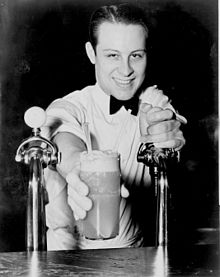Soda jerk

Soda jerk passing an ice cream soda between two soda fountains, New York City, 1936

A soda jerk tossing a scoop of ice cream into a metal mixing cup before blending a malted shake, Texas, 1939
A soda jerk (or soda jerker[1]) is a person—typically a youth—who operates the soda fountain in a drugstore, often for the purpose of preparing and serving soda drinks and ice cream sodas.[2] This was made by putting flavored syrup into a specially designed tall glass and adding carbonated water. One or two scoops of ice cream, or occasionally malt powder, could be added. The result was served with a long-handled spoon, most commonly known as a "soda spoon", and drinking straws.
Contents
1 Origin of term
2 History
3 Lingo
4 Restaurant
5 See also
6 References
7 External links
Origin of term
The term 'soda jerk' was a pun on 'soda clerk', the formal job title of the drugstore assistants who operated soda fountains. It was inspired by the "jerking" action the server would use to swing the soda fountain handle back and forth when adding the soda water.[3] The soda fountain spigot itself typically was a sturdy, shiny fixture on the end of a pipe or other similar structure protruding above the counter, curving towards where the glasses would be filled. All of the drinks were made of unflavored carbonated water. Consequently, the tap handle was large, as the soda jerker would use it frequently. This made the mixing of drinks a center of activity at the soda fountain.
History
The practice of operating a soda fountain in a drugstore reached its peak popularity in the 1940s[4] but was popular from the 20s through the 50s. The position was coveted, and was commonly only awarded after protracted menial labor in the store.[4] Soda jerking was dominated by popular young men with loud personalities and good people skills because of the popular environment and 'cool' association. These boys who worked at the shops were expected to serve the drinks and also socialize and entertain the guests.
Michael Karl Witzel describes an archetypal soda jerk as "[a] consummate showman, innovator and freelance linguist ... the pop culture star of the Gilded Age".[4][clarification needed]
The proliferation of ice cream parlors declined as drive-ins and walk-up fast food stands grew in popularity, and grill and fry cooks replaced soda jerks.[4] Some modern theme diners are styled after establishments in the 1950s and include a soda jerk, along with retro jukeboxes and booth seating.
Generally, soda jerks wore iconic white paper or cloth caps called “Soda jerk caps”, button-up shirts with a bow tie and an apron as their uniform.
Lingo
Soda jerks were known for having their own lingo for how their drinks were made. They created nicknames for different drinks. For example they called a glass of milk “baby” and a strawberry milkshake “in the hay”.[5] They also had lingo to express how they wanted their drink to be served. Coffee being called “draw one” would be served strong if called “draw one from the south”. If a drink was ordered with extra ice it was “Heavy on the hail”.[5]
Some of these terms are used today. Egg Creams, the short hand for a chocolate soda with some milk, are served in many places and are especially known in New York where it originated.[6]
Java, slang for coffee, is now in the name of many coffee shops like Java Coffee and Tea Co.,[7] Java! Java! Coffee,[8] and Java Joe’s.[9] Even Java computer programing has its logo as a cup of coffee.[10]
Concrete is another term from Soda Jerk lingo that is still used. Concrete's definition remains a super thick milkshake or custard. Today, a company known for using the term is Culver's, because of their Concrete Mixers.[11]
Restaurant
Soda Jerks is a name of a restaurant/soda shop on the Santa Monica pier in California inspired by an original Soda Jerk called Hilltown Lunch Counter and decor from the 1930s and 1940s.[12]
Hilltown Lunch Counter was created in 1937 by Don McCafferty and is a family run business and its recreation is now run by his grandson, Kevin McCafferty.[12]
See also
- Barista
- Bartender
- Lunch counter
- Milk bar
- Milkshake
- Coffeehouse
References
^ Allen, Irving (1993). The City in Slang. Oxford Oxfordshire: Oxford University Press. ISBN 0-19-509265-1..mw-parser-output cite.citation{font-style:inherit}.mw-parser-output .citation q{quotes:"""""""'""'"}.mw-parser-output .citation .cs1-lock-free a{background:url("//upload.wikimedia.org/wikipedia/commons/thumb/6/65/Lock-green.svg/9px-Lock-green.svg.png")no-repeat;background-position:right .1em center}.mw-parser-output .citation .cs1-lock-limited a,.mw-parser-output .citation .cs1-lock-registration a{background:url("//upload.wikimedia.org/wikipedia/commons/thumb/d/d6/Lock-gray-alt-2.svg/9px-Lock-gray-alt-2.svg.png")no-repeat;background-position:right .1em center}.mw-parser-output .citation .cs1-lock-subscription a{background:url("//upload.wikimedia.org/wikipedia/commons/thumb/a/aa/Lock-red-alt-2.svg/9px-Lock-red-alt-2.svg.png")no-repeat;background-position:right .1em center}.mw-parser-output .cs1-subscription,.mw-parser-output .cs1-registration{color:#555}.mw-parser-output .cs1-subscription span,.mw-parser-output .cs1-registration span{border-bottom:1px dotted;cursor:help}.mw-parser-output .cs1-ws-icon a{background:url("//upload.wikimedia.org/wikipedia/commons/thumb/4/4c/Wikisource-logo.svg/12px-Wikisource-logo.svg.png")no-repeat;background-position:right .1em center}.mw-parser-output code.cs1-code{color:inherit;background:inherit;border:inherit;padding:inherit}.mw-parser-output .cs1-hidden-error{display:none;font-size:100%}.mw-parser-output .cs1-visible-error{font-size:100%}.mw-parser-output .cs1-maint{display:none;color:#33aa33;margin-left:0.3em}.mw-parser-output .cs1-subscription,.mw-parser-output .cs1-registration,.mw-parser-output .cs1-format{font-size:95%}.mw-parser-output .cs1-kern-left,.mw-parser-output .cs1-kern-wl-left{padding-left:0.2em}.mw-parser-output .cs1-kern-right,.mw-parser-output .cs1-kern-wl-right{padding-right:0.2em}
^ Partridge, Eric (2006). The New Partridge Dictionary of Slang and Unconventional English. New York: Routledge. ISBN 0-415-21258-8.
^ McCafferty, Kevin. "Soda Jerks History". San Gabriel Valley Menus. Archived from the original on 2006-09-27. Retrieved 2006-11-03.
^ abcd Witzel, Michael (2002). "Splendour of the Soda Fountains". The American Drive-in Restaurant. Osceola: Motorbooks International. ISBN 0-7603-1350-4.
^ ab "Soda Jerks: A Lingo All Their Own - HamiltonBeach.com". www.hamiltonbeach.com. Retrieved 2018-05-21.
^ Stradley, Linda (2015-04-17). "New York Egg Cream Recipe And History, Whats Cooking America". What's Cooking America. Retrieved 2018-05-21.
^ "Java Coffee & Tea Co. - Fine Coffee & Tea - Houston, Texas". Java Coffee & Tea Co. Retrieved 2018-05-21.
^ "Home | Java! Java! Coffee - Maple Valley, Washington". javajavacoffee.com. Retrieved 2018-05-21.
^ "java". www.javajos.com. Retrieved 2018-05-21.
^ "java.com: Java + You". www.java.com. Retrieved 2018-05-21.
^ "Concrete Mixers | Frozen Custard & Candy Mixers | Culver's". Culver's. Retrieved 2018-05-21.
^ ab "History of Soda Jerks - Santa Monica Ice cream-Milkshakes-Soda Fountain". www.sodajerksusa.com. Retrieved 2018-05-21.
External links
- Albright, Andrea. "Longtime soda jerk closes up shop", The Topeka Capital-Journal, July 9, 2000.